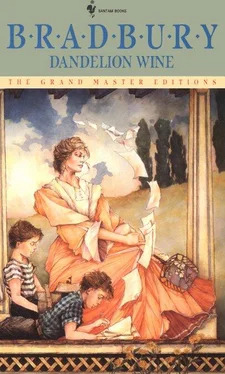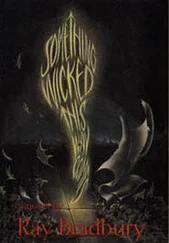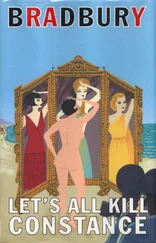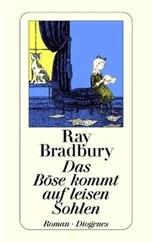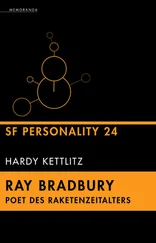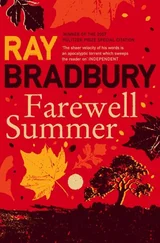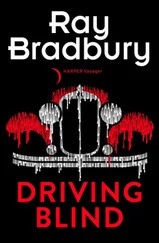“We must’ve killed him. And someone must’ve seen and followed us. Look . . .”
Miss Fern and Miss Roberta peered from the cobwebbed attic window. Below, as if no great tragedy had occurred, the oaks and elms continued to grow in fresh sunlight. A boy strolled by on the sidewalk, turned, strolled by again, looking up.
In the attic the old women peered at each other as if trying to see their faces in a running stream.
“The police!”
But no one hammered the downstairs door and cried, “In the name of the law!” “Who’s that boy down there?”
“Douglas, Douglas Spaulding! Lord, he’s come to ask for a ride in our Green Machine. He doesn’t know. Our pride has ruined us. Pride and that electrical contraption!”
“That terrible salesman from Gumport Falls. It’s his fault, him and his talking.”
Talking, talking, like soft rain on a summer roof.
Suddenly it was another day, another noon. They sat with white fans and dishes of cool, trembling lime Jell-O on their arbored porch.
Out of the blinding glare, out of the yellow sun, glittering, splendid as a prince’s coach . . .
THE GREEN MACHINE!
It glided. It whispered, an ocean breeze. Delicate as maple leaves, fresher than creek water, it purred with the majesty of cats prowling the noontide. In the machine, his Panama hat afloat in Vaseline above his ears, the salesman from Gumport Falls! The machine, with a rubber tread, soft, shrewd, whipped up their scalded white sidewalk, whirred to the lowest porch step, twirled, stopped. The salesman leaped out, blocked off the sun with his Panama. In this small shadow, his smile flashed.
“The name is William Tara! And this—” He pinched a bulb. A seal barked. “—is the hem!” He lifted black satin cushions. “Storage batteries!” A smell of lightning blew on the hot air. “Steering lever! Foot rest! Overhead parasol! Here, in tote, is The Green Machine!”
In the dark attic the ladies shuddered, remembering, eyes shut.
“Why didn’t we stab him with our darning needles!”
“Shh! Listen.”
Someone knocked on the front door downstairs. After a time the knocking stopped. They saw a woman cross the yard and enter the house next door.
“Only Lavinia Nebbs, come with an empty cup, to borrow sugar, I guess.”
“Hold me, I’m afraid.”
They shut their eyes. The memory-play began again. An old straw hat on an iron trunk was suddenly flourished, it seemed, by the man from Gumport Falls.
“Thanks, I will have some iced tea.” You could hear the cool liquid shock his stomach, in the silence. Then he turned his gaze upon the old ladies like a doctor with a small light, looking into their eyes and nostrils and mouths. “Ladies, I know you’re both vigorous. You look it. Eighty years”-he snapped his fingers—“mean nothing to you! But there are times, mind, when you’re so busy, busy, you need a friend indeed, a friend in need, and that is the two-seater Green Machine.”
He fixed his bright, stuffed-fox, green-glass-eyed gaze upon that wonderful merchandise. It stood, smelling new, in the hot sunlight, waiting for them, a parlor chair comfortably put to wheels.
“Quiet as a swan’s feather.” They felt him breathe softly in their faces. “Listen.” They listened. “The storage batteries are fully charged and ready now! Listen! Not a tremor, not a sound. Electric, ladies. You recharge it every night in your garage.”
“It couldn’t—that is—” The younger sister gulped some iced tea. “It couldn’t electrocute us accidently?”
“Perish the thought!”
He vaulted to the machine again, his teeth like those you saw in dental windows, alone, grimacing at you, as you passed by late at night.
“Tea parties!” He waltzed the runabout in a circle. “Bridge clubs. Soirees. Galas. Luncheons. Birthday gatherings! D. A. R. breakfasts.” He purred away as if running off forever. He returned in a rubber-tired hush. “Gold Star Mother suppers.” He sat primly, corseted by his supple characterization of a woman. “Easy steering. Silent, elegant arrivals and departures. No license needed. On hot days—take the breeze. Ah . . .He glided by the porch, head back, eyes closed deliciously, hair tousling in the wind thus cleanly sliced through.
He trudged reverently up the porch stairs, hat in hand, turning to gaze at the trial model as at the altar of a familiar church. “Ladies,” he said softly, “twenty-five dollars down. Ten dollars a month, for two years.”
Fern was first down the steps onto the double seat. She sat apprehensively. Her hand itched. She raised it. She dared tweak the rubber bulb horn.
A seal barked.
Roberta, on the porch, screamed hilariously and leaned over the railing.
The salesman joined their hilarity. He escorted the older sister down the steps, roaring, at the same time taking out his pen and searching in his straw hat for some piece of paper or other.
And so we bought it!” remembered Miss Roberta, in the attic, horrified at their nerve. “We should’ve been warned! Always did think it looked like a little car off the carnival roller coaster!”
“Well,” said Fern defensively, “my hip’s bothered me for years, and you always get tired walking. It seemed so refined, so regal. Like in the old days when women wore hoop skirts. They sailed! The Green Machine sailed so quietly.”
Like an excursion boat, wonderfully easy to steer, a baton handle you twitched with your hand, so.
Oh, that glorious and enchanted first week—the magical afternoons of golden light, humming through the shady town on a dreaming, timeless river, seated stiffly, smiling at passing acquaintances, sedately purring out their wrinkled claws at every turn, squeezing a hoarse cry from the black rubber horn at intersections, sometimes letting Douglas or Tom Spaulding or any of the other boys who trotted, chatting, alongside, hitch a little ride. Fifteen slow and pleasurable miles an hour top speed. They came and went through the summer sunlight and shadow, their faces freckled and stained by passing trees, going and coming like an ancient, wheeled vision.
“And then,” whispered Fern, “this afternoon! Oh, this afternoon!”
“It was an accident.”
“But we ran away, and that’s criminal!”
This noon. The smell of the leather cushions under their bodies, the gray perfume smell of their own sachets trailing back as they moved in their silent Green Machine through the small, languorous town.
It happened quickly. Rolling soft onto the sidewalk at noon, because the streets were blistering and fiery, and the only shade was under the lawn trees, they had glided to a blind comer, bulbing their throaty horn. Suddenly, like a jack-in-the-box, Mister Quartermain had tottered from nowhere!
“Look out!” screamed Miss Fern.
“Look out!” screamed Miss Roberta.
“Look out!” cried Mister Quartermain.
The two women grabbed each other instead of the steering stick.
There was a terrible thud. The Green Machine sailed on in the hot daylight, under the shady chestnut trees, past the ripening apple trees. Looking back only once, the two old ladies’ eyes filled with faded horror.
The old man lay on the sidewalk, silent.
“And here we are,” mourned Miss Fern in the darkening attic. “Oh, why didn’t we stop! Why did we run away?”
“Shh!” They both listened.
The rapping downstairs came again.
When it stopped they saw a boy cross the lawn in the dim light. “Just Douglas Spaulding come for a ride again.” They both sighed.
The hours passed; the sun was going down.
“We’ve been up here all afternoon,” said Roberta tiredly. “We can’t stay in the attic three weeks hiding till everybody forgets.”
“We’d starve.”
Читать дальше
